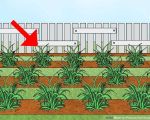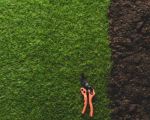How to Keep Your Lawn Healthy Without Chemicals
When I first moved into my home, I was excited to take care of my new lawn. The idea of having a vibrant, green lawn was something that seemed simple at first. However, I quickly realized that keeping a lawn healthy wasn’t as easy as it appeared. Most of the advice I received involved using chemical fertilizers and pesticides, but I didn’t want to go down that route. I wanted a healthy lawn that was not only beautiful but also safe for my kids and pets. That’s when I decided to explore how to keep a lawn healthy without chemicals. In this article, I’ll share the insights I’ve gained from my journey and provide you with practical, sustainable tips that you can apply to your own lawn care routine.
1. Understanding the Importance of Going Chemical-Free
The first step in going chemical-free is understanding why it matters. Many people don’t realize the long-term consequences of using synthetic chemicals on their lawn. Chemicals can contaminate the soil, harm beneficial insects, and even run off into nearby water systems, affecting the local ecosystem. By choosing natural methods, you’re not only improving the health of your lawn but also contributing to a healthier environment.
2. Start with Healthy Soil
The foundation of a healthy lawn lies in the soil. Healthy soil is teeming with beneficial microbes that break down organic matter and release nutrients for your grass. If the soil is poor, no amount of fertilizer, chemical or organic, will make your lawn thrive. To improve soil health, consider aerating your lawn. Aeration helps to break up compacted soil, allowing water and nutrients to reach the grassroots. Additionally, you can add organic compost or mulch to nourish the soil with essential nutrients.
3. Choose the Right Grass for Your Region
Not all types of grass thrive in every climate. In my case, I live in the Midwest, and after researching, I found that fescue and Kentucky bluegrass are best suited for my region. Choosing the right type of grass for your area means less stress on your lawn, and it will naturally grow better without needing excessive care. Native grass varieties are also great for the environment, as they require less water and are more resilient to pests.
4. Natural Fertilizers for a Lush Lawn
One of the most common ways to care for a lawn is through fertilization, but instead of using chemical fertilizers, I turned to natural alternatives. Organic fertilizers like compost, bone meal, and fish emulsion are excellent choices. They not only provide essential nutrients but also help improve the soil structure over time. The slow-release nature of these organic fertilizers means that your lawn gets a steady supply of nutrients without the risk of chemical buildup.
5. How to Control Weeds Without Chemicals
Weeds are a common issue, but using herbicides isn’t the only solution. In fact, chemical weed killers can damage your lawn and the environment. Instead, I recommend using manual methods like hand weeding, which is effective for small infestations. For larger weed problems, mulching around plants or applying a natural weed barrier like corn gluten meal can help prevent weed growth. Additionally, encouraging a dense, healthy lawn through proper care can naturally crowd out weeds, reducing their presence.
6. Managing Pests Naturally
Dealing with pests is another challenge I faced. Chemical pesticides are harmful to beneficial insects, and over time, they can lead to pest resistance. Instead, I opted for natural pest control methods. For example, introducing ladybugs to my garden helped reduce aphid populations. I also used neem oil as a natural insect repellent. Additionally, encouraging birds and beneficial insects like bees can help maintain a balanced ecosystem that keeps pests in check.
7. Watering Wisely
Watering your lawn is essential, but overwatering can lead to shallow roots and promote weed growth. I learned that it’s better to water deeply and infrequently, as this encourages deeper root growth. Early morning watering is ideal because it allows the grass to dry out before evening, reducing the chance of fungal diseases. A good rule of thumb is to water once or twice a week, depending on the weather conditions, rather than daily watering.
8. Mowing Techniques for a Healthier Lawn
Mowing may seem like a simple task, but the way you mow can make a significant impact on your lawn’s health. I’ve found that mowing too short can stress the grass and make it more susceptible to disease. Instead, I mow my lawn at a higher setting, which allows the grass to develop deeper roots and shade out weeds. Additionally, keeping your mower blades sharp ensures clean cuts, reducing the risk of lawn damage.
9. Embrace Mulching
One of the easiest ways to improve your lawn’s health without chemicals is by mulching. Mulch helps to retain moisture, suppress weeds, and regulate soil temperature. I love using grass clippings as mulch. After mowing, I leave the clippings on the lawn, and they decompose, adding nutrients back into the soil. This simple practice has saved me time and money while keeping my lawn healthy.
10. Stay Patient and Observe the Results
Transitioning to chemical-free lawn care won’t happen overnight, and that’s okay. It took me a season or two to really see the full benefits of organic lawn care. However, I noticed that my lawn became more resilient over time. The grass grew thicker, the weeds became less of an issue, and I felt good knowing I was taking care of my lawn in a sustainable way. It’s important to be patient and observe your lawn’s response to natural care methods. With time, you’ll see the results of your efforts.
Taking the chemical-free approach to lawn care has transformed not just the appearance of my yard but also my relationship with nature. By making simple changes and choosing organic methods, I’ve created a healthier, safer environment for my family and for the planet. If you’re looking for the best chemical-free lawn care services in your area, I highly recommend exploring Lawn Care Services for expert advice and assistance.








